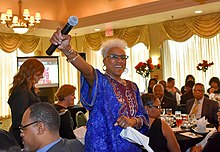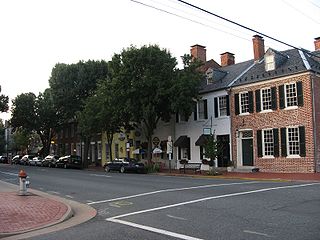
Fredericksburg is an independent city in Virginia, United States. As of the 2020 census, the population was 27,982. It is 48 miles (77 km) south of Washington, D.C., and 53 miles (85 km) north of Richmond. The Bureau of Economic Analysis of the United States Department of Commerce combines the city of Fredericksburg with neighboring Spotsylvania County for statistical purposes.
The origins of rock and roll are complex. Rock and roll emerged as a defined musical style in the United States in the early to mid-1950s originating from African-American music. It derived most directly from the rhythm and blues music of the 1940s, which itself developed from earlier blues, the beat-heavy jump blues, boogie woogie, up-tempo jazz, and swing music. It was also influenced by gospel, country and western, and traditional folk music. Rock and roll in turn provided the main basis for the music that, since the mid-1960s, has been generally known simply as rock music.
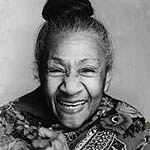
Alberta Hunter was an American jazz and blues singer and songwriter from the early 1920s to the late 1950s. After twenty years of working as a nurse, Hunter resumed her singing career in 1977.

Gladys Alberta Bentley was an American blues singer, pianist, and entertainer during the Harlem Renaissance.
Saffire – The Uppity Blues Women was a three-woman blues musical ensemble in the Washington, D.C. area. It was founded in 1984 by Ann Rabson, Gaye Adegbalola and Earlene Lewis. Lewis separated from the band in 1992 and was replaced by Andra Faye. The group then featured Rabson on piano, vocals and guitar, Adegbalola on vocals and guitar, and Faye on vocals, bass, mandolin, violin and guitar.

Juanita Hall was an American musical theatre and film actress. She is remembered for her roles in the original stage and screen versions of the Rodgers and Hammerstein musicals South Pacific as Bloody Mary – a role that garnered her the Tony Award – and Flower Drum Song as Madame Liang.
Ann Rabson was an American blues vocalist, pianist and guitar player. She was a solo recording artist signed to Alligator Records and was a member of Saffire - The Uppity Blues Women, an acoustic blues band that disbanded amicably in 2009.

Anne Bethel Spencer was an American poet, teacher, civil rights activist, librarian, and gardener. She was a prominent figure of the Harlem Renaissance, also known as the New Negro Movement, despite living in Virginia for most of her life, far from the center of the movement in New York. She met Edward Spencer while attending Virginia Seminary in Lynchburg, Virginia. Following their marriage in 1901, the couple moved into a house he builtArchived 2020-11-30 at the Wayback Machine at 1313 Pierce Street, where they raised a family and lived for the remainder of their lives.

"Caldonia" is a jump blues song, first recorded in 1945 by Louis Jordan and his Tympany Five. Although credited to Fleecie Moore, his wife at the time, Jordan is the actual songwriter. The song was a hit for Jordan as well as several other musicians.
Rosa Henderson was an American jazz and classic female blues singer and vaudeville entertainer of the Harlem Renaissance era.
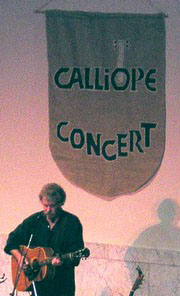
Calliope: Pittsburgh Folk Music Society is an organization that promotes folk music and folk dance in the Pittsburgh, Pennsylvania, area. The Society started in the late 1960s, when performances were often held in George Balderose's house. As time went on, the Society grew and eventually began renting out other performance venues for its shows. Since 1976, Calliope has been a nonprofit educational and presenting organization that promotes and preserves traditional and contemporary folk music and its allied arts. Today, Calliope sponsors various musical performances, a school of music, and now Rootz: The Green City Music Festival.
Virginia Women in History was an annual program sponsored by the Library of Virginia that honored Virginia women, living and dead, for their contributions to their community, region, state, and nation. The program began in 2000 under the aegis of the Virginia Foundation for Women and Delta Kappa Gamma Society International; from 2006 to 2020 it was administered by the Library of Virginia. In 2021, it was replaced by the Strong Men and Women in Virginia History program.

E.G. Kight is an American Chicago blues singer, guitarist and songwriter. She has worked with many musicians, including George Jones, Jerry Lee Lewis, Conway Twitty, Merle Haggard, Luther Allison, Hubert Sumlin, Pinetop Perkins, Taj Mahal, B.B. King, and Koko Taylor. Kight has recorded seven albums to date and received several nominations for Blues Music Awards, in the categories Contemporary Female Artist and Song of the Year.

Viola Gertrude Wells Evans, better known by her stage names Viola Wells or Miss Rhapsody, was an American jazz, blues, and religious singer.
Art Stewart is an American record producer, audio engineer, and composer who has worked on many Motown recordings. He worked on the Blue album by Diana Ross, and recordings by Teena Marie, including her Wild and Peaceful album, released in 1979. With Marvin Gaye, he has worked on the Let's Get It On album and Gaye's single "Got to Give It Up". He has also worked with Rick James on his Motown debut album Come Get It!, and his second Motown album, Bustin' Out of L Seven.
Skeeter Brandon was an American blind blues keyboardist, singer and songwriter.
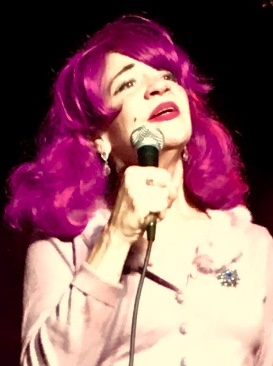
Susan Dimiti "Suzy" Williams is an American singer-songwriter. She rose to notoriety in the musical duo Stormin’ Norman & Suzy. Williams has performed at venues ranging from Carnegie Hall and Lincoln Center to the Hotel Palmas in the Canary Islands, and on network television and film. She has been reviewed in publications including Rolling Stone, The New York Times, Cosmopolitan, and Los Angeles Magazine. Her singing was referred to in Rolling Stone as a "mixture of Bessie Smith, Sophie Tucker, and perhaps a trace of Janis Joplin".
Arthur Migliazza is an American blues and boogie woogie pianist.

Bitter Sweet Blues is an album by the American musician Gaye Adegbalola, released in 1999. Recorded for Alligator Records, it was her first solo album.
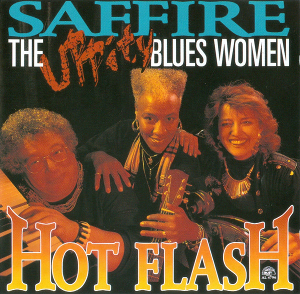
Hot Flash is an album by the American musical trio Saffire – The Uppity Blues Women, released in 1991. It was their second album for Alligator Records and one of the label's best selling titles. The trio supported the album with a North American tour. Hot Flash also served as the title of a 2008 documentary about the trio.
